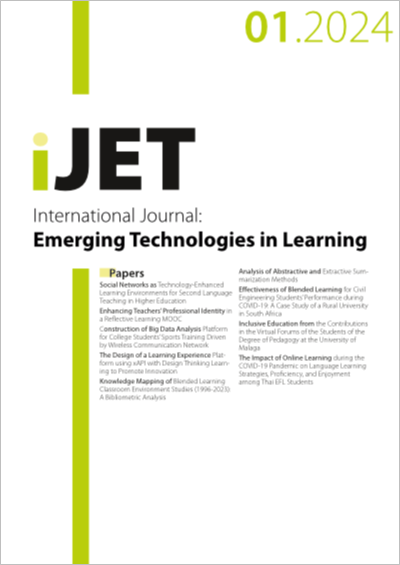The Impact of Online Learning during the COVID-19 Pandemic on Language Learning Strategies, Proficiency, and Enjoyment among Thai EFL Students
DOI:
https://doi.org/10.3991/ijet.v19i01.46401Keywords:
language learning strategies, language proficiency, enjoyment of English learning, undergraduates, online learningAbstract
Amidst the COVID-19 pandemic, individuals worldwide found themselves compelled to adapt to unforeseen circumstances. An integral part of this adjustment was the transformation of conventional instructional methods, shifting from traditional classroom-based learning to the realm of online education. In this new educational landscape, online learning has emerged as the only avenue for both educators and learners to sustain their academic journeys. The objective of this study was to examine potential changes in the application of language learning strategies (LLSs) in the context of online English learning amidst the COVID-19 pandemic. The study also aimed to explore whether these variations were influenced by individuals’ levels of language proficiency and their level of enjoyment of learning English. If any variations were identified, the study aimed to analyze the specific patterns that emerged. The study included 205 students who were enrolled in a public university in northeastern Thailand. Data collection involved administering both the LLS questionnaire and the enjoyment of the English learning questionnaire. Quantitative data analysis involved the use of descriptive statistics, ANOVA, and Chi-square tests. The study revealed significant variations in the frequency of overall strategy utilization based on two variables: language proficiency and individual enjoyment with the process of learning English. While there were no significant variations in overall strategy usage based on language proficiency, notable differences were observed based on their level of enjoyment of learning English. In terms of distinct categories, significant differences were observed in the utilization of LLS within the metacognitive (MET) and affective (AFF) categories, especially concerning language proficiency. Moreover, substantial variances were evident across all six categories—memory (MEM), cognitive (COG), compensation (COM), MET, AFF, and social (SOC)—in the level of satisfaction derived from the process of learning English.
Downloads
Published
How to Cite
Issue
Section
License
Copyright (c) 2023 Parichart Toomnan

This work is licensed under a Creative Commons Attribution 4.0 International License.



